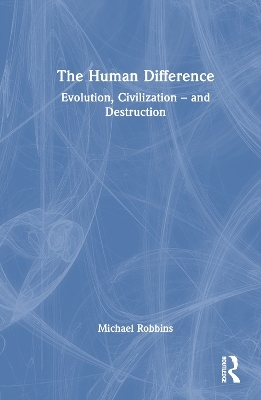
The Human Difference
Routledge (Verlag)
978-1-032-56944-4 (ISBN)
From a multidisciplinary perspective grounded in psychoanalysis, this book explores the manifestations of mind that distinguish humans from other species, culture, civilization, and destructiveness.
Psychoanalysis was created by Freud in an effort to understand neurosis and psychosis, the names he gave to individual human destructiveness. His understanding was limited and incorrect because the science of evolution and the disciplines of sociology and cultural anthropology were in their infancy when he formulated his ideas. He did not comprehend that destructiveness is qualitatively different in humans than in other species and he ignored the problem of how biological instincts become mental processes. These limitations left psychoanalysis with one of its most perplexing unsolved problems, the mysterious leap from mind to body. This book explains how neoteny, the prolonged period of postnatal immaturity that distinguishes humans from other animals, requires and enables complex learning from caregivers. It is the knowledge acquired from this learning and its intergenerational transmission that links the biological theory of evolution with the psychosocial theory of psychoanalysis and explains how the human species is unique.
This book will be of interest to those who want to learn about how integrating the findings of evolutionary science, primatology, sociology, and cultural anthroplogy with the theory of psychoanalysis expands our understanding of what makes humans unique and its implications for the future of our species, and how it empowers us to influence the destiny of humankind.
Michael Robbins is a psychoanalyst, member of the American and International Psychoanalytic Societies, former professor of Clinical Psychiatry at Harvard Medical School, and author of 5 previous books and more than 40 articles in refereed journals.
1. Introduction: The Mutually Enriching Contributions of the Psychoanalytic Theory of Mind and the Biological Theory of Evolution to Understanding the Uniqueness of Human Civilization and Human Destructivess 2. Homo Destrudo: The Manifestations of Human Destructiveness 3. Human Destructiveness in Mythology and Fiction 4. A History of the Contributions and Limitations of Psychoanalysis and Other Disciplines to the Understanding of Human Destructiveness 5. The Difference Between Humans and Other Primate Species: Complex Learning and the Accumulation and Intergenerational Transmission of Knowledge 6. The Theory of Evolution and its Limitations Comprehending the Human Difference 7. Revising the Theory of Evolution to Account for the Human Difference 8. The Unique Nature of Human Mind: Reflective Representational Thought 9. The Origins of Reflective Thought and Human Individuality During the Attachment-Separation Phase of Development 10. The Basic Principles Governing the Social Organization of Species 11. Human Social Organization in the Beginning: Inferences from Remaining Human Tribes 12. Evolution of the Human Social Difference Through the Acquisition and Intergenerational Transmission of Knowledge 13. The Developmental Origins of Individual Destructiveness: The Interaction of Biology and Learning 14. Individual Human Destructivess: From Failures of Self-Care to the Spectrum of Psychoses 15. Individual Human Destructiveness: Four Patients and a Former President 16. Social Destructiveness: The Clash Between Groups: Belief versus Belief, Belief verus Reflective Thought, and Reflective Thought verus Reflective Thought 17. Civilization and the Confusing Interaction of Constructive and Destructive Forces 18. Implications of a Psychoanalytic Understanding of the Human Difference Based on a Revised Theory of Evolution for Society and for the Fate of Our Species
| Erscheinungsdatum | 04.10.2023 |
|---|---|
| Verlagsort | London |
| Sprache | englisch |
| Maße | 156 x 234 mm |
| Gewicht | 380 g |
| Themenwelt | Geisteswissenschaften ► Psychologie ► Psychoanalyse / Tiefenpsychologie |
| Medizin / Pharmazie ► Medizinische Fachgebiete ► Psychiatrie / Psychotherapie | |
| Sozialwissenschaften ► Ethnologie | |
| Sozialwissenschaften ► Soziologie | |
| ISBN-10 | 1-032-56944-1 / 1032569441 |
| ISBN-13 | 978-1-032-56944-4 / 9781032569444 |
| Zustand | Neuware |
| Haben Sie eine Frage zum Produkt? |
aus dem Bereich


